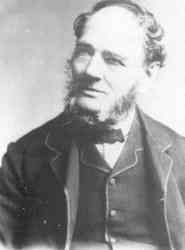Friends of Hastings Cemetery

appreciated his industry. He left the firm in 1837 after an attack of influenza, and subsequently went into the Post Office in George Street, under Mr Woods.
It was this which led him to style his effusions in later years as the contributions of "The Postman". At this time he added tailoring to his many accomplishments. In 1839 he started for America, to join Mr Woods' son. But he sustained an injury to his spine, was landed at Spithead, and returned home. In the autumn of the same year he became a schoolmaster at Market Terrace, near the St Leonards Archway. For a time he took charge of the National Schools at St Leonards concurrently with his own school. On the 25th January 1844 he was married at Winchelsea. Mr Brett's wife predeceased him about six years. Two sons — Mr Rowland Brett and Mr Herbert Brett — survive him. Mr Henry Kirby, of Mercatoria, St Leonards, in a son-
In January 1894, on the occasion of his golden wedding, Mr Brett was presented with an illuminated address and a sum of two hundred guineas by his fellow townsmen.
Mr Brett was one of the original founders of the St Leonards Institute in Norman Road (known for many years as the Mechanics' Institute) in 1848. He held the office of treasurer from the year 1853. Mr Brett succeeded Mr Wilson Noble, formerly MP for Hastings, as president of the Institute in 1888, two years after the death of Mr Stephen Putland, Mr Wilson Noble's predecessor, whose portrait hangs side by side with that of Mr Brett in the Institute. In November 1903 the members of the Institute presented the portrait to Mr Brett, to be placed in the reading-
The journalistic work of our departed townsman commenced over 60 years ago, when he became a contributor to the Sussex Advertiser. In 1854 he conceived the idea of leaving the printing trade and starting a newspaper of his own. For this purpose he brought a typographer from London in order to learn to set type. He bought a printing press, and issued the Penny Press as a monthly periodical. The local Gazette was first issued about a year after the appearance of the Penny Press. As a journalist Mr Brett always had a reputation for independence of party.

Mr Brett's natural abilities were great, for a year and a half's school constituted the whole of his Academical training. His father was a blacksmith, who was found dead in a fishing boat in 1826. Two years after his father's death his mother married a Mr Woolgar, and the son who was to make for himself such a name in local records was sent to school at Mr Neve's, in Bourne Street; the weekly fee at that seminary was one penny. He soon became a monitor of the first class. Two books from which he learnt most when a lad were The Young Man's Best Companion and Matthew Henry's Commentary. Mr Woolgar's smithy was on the spot where Holy Trinity Church now stands.
Mr Brett, after working as a lad at the Smithy, entered the drapery establishment of Messrs Clement and Inskipp, near the Fishmarket. There he worked from seven a.m. till nine p.m. He was afterwards apprenticed there, without premium, the firm, no doubt, having